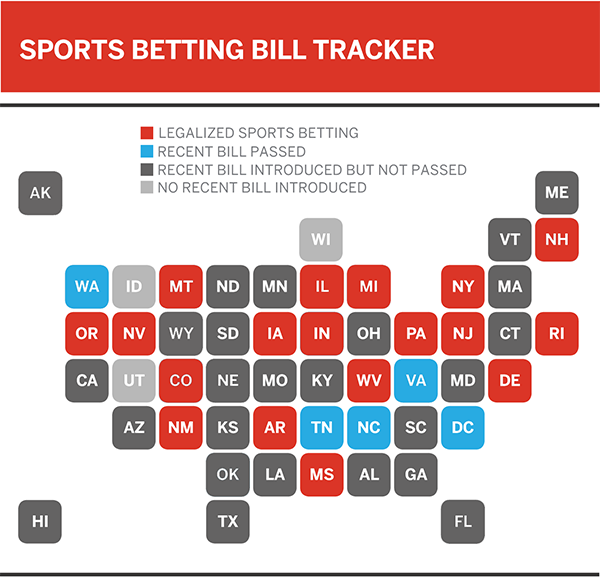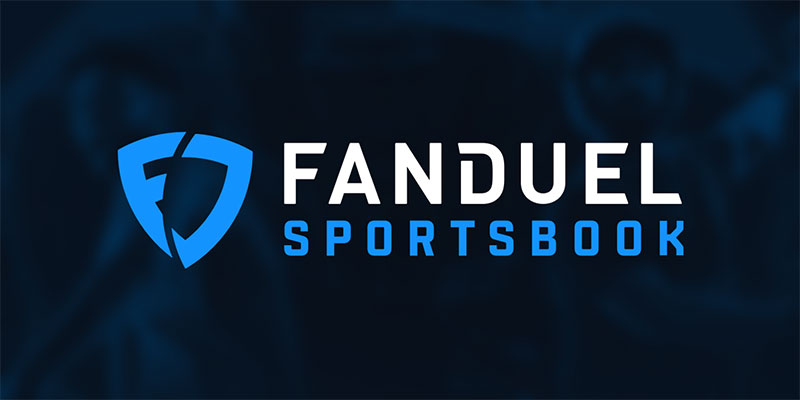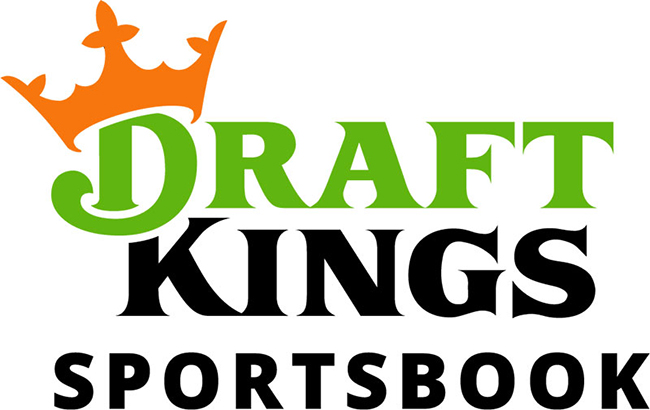How to Invest in Sports Betting – 10 Sports Betting Stocks to Know
Sports betting, broadly speaking, is the act of betting on the outcome of a sporting event. For most people, even those who choose not to participate in sports betting, the notion that one can bet on sports shouldn’t be that foreign. With that said, the idea that investors can now bet on sports betting is relatively new, especially for US-based investors.
Between 1992 and 2018, sports betting was illegal at the federal level in the United States (with a few exceptions, notably Nevada). In May of 2018, the US Supreme Court found that the Profession and Amateur Sports Protection Act of 1992 (PASPA) violated the 10th Amendment of the U.S. Constitution. While this didn’t legalize sports betting in the United States, it did open the door for individual states to legalize sports betting within their borders.
Thus began a process of legalization across the individual states comprising the country, with 18 states already there, 6 in the on-deck circle (including D.C.), and 24 more moving towards legalization (per ESPN as of June 9th). It is for this reason that sports betting is increasingly relevant to investors: unregulated sports betting cannot materially impact publicly traded companies in the way that legal sports betting can!

Source: ESPN (as of June 9, 2020)
(As an aside, the US is simply one example, albeit a large one, from a broader trend towards legalization on a global basis).
In this post, we look at the investment landscape for sports betting, a category we’ve broken down into four primary categories: Sportsbooks, Casinos, Technology, and Lead Generation (plus a bonus fifth category for those who keep reading). We provide examples of publicly traded companies in each category for reference.
Disclaimer: the companies listed below are simply examples and are not recommendations to buy or sell securities.
Sportsbook
Simply put, a sportsbook is a place where people can wager on sports. The landscape for sportsbooks has evolved fairly rapidly in recent years, driven in part by legal changes across the globe. As regulation allows, sportsbook operations continue to migrate from “brick and mortar” to online. Sportsbooks are typically structured such that bettors must risk more capital than they stand to win (i.e. bet $110 to win $100), resulting in positive gross gaming revenues. However, sportsbooks are generally less profitable to the operators than casinos, which further favor “the house”.
Below we highlight three companies that we assigned to the “sportsbook” thematic relevance category, while noting that companies in this category often have traits of other categories built in.
Flutter (FLTR LN)
Market Capitalization: $20.3 billion
Flutter Entertainment is a global sports betting and gaming operator with a portfolio of leading international brands and operations. The company's assets are allocated across four primary divisions: US (FanDuel, TVG, Betfair), Australia (SportsBet), PPB Online (Paddy Power, Betfair, Adjarabet) and PPB Retail. Flutter acquired The Stars Group, the parent company of PokerStars in 2020.
FanDuel: A well-known sports betting brand within the US, FanDuel got its start as a provider of daily fantasy sports (DFS) in the US. Using the argument that DFS is a game of skill, FanDuel and its primary competitor, DraftKings, proliferated in the 2010’s as a viable alternative to more traditional sports betting
 .
.
PaddyPower: Founded in 1988 in Dublin, PaddyPower started as a merger of three Irish bookmakers. In addition to its sportsbook, PaddyPower takes bets across other game-types in-person, over the phone, and online.
Betfair: Founded in 2000 in London, Betfair operates the world’s largest online betting exchange and was the first betting company to sponsor an English football team. Betfair listed on the London Stock Exchange prior to merging with Paddy Power to form Paddy Power Betfair in 2016.
DraftKings (DKNG)
Market Capitalization: $11.7 billion
DraftKings is a publicly traded daily fantasy and sports betting company headquartered in Boston, Massachusetts. Like Flutter, DraftKings leveraged the brand it built with consumers of DFS to move into sports betting more broadly in 2018, when it became the first legal mobile sports betting operator in the state of Jersey. The company continues to expand its digital footprint into iGaming via DraftKings Casino.
DraftKings became a publicly traded company in April of 2020 when a special-purpose acquisition company (SPAC) named Diamond Eagle Acquisition Corp. executed a reverse merger involving DraftKings and SBTech Global, a prominent sports betting technology provider.

SBTech: Founded in 2007, SBTech offers full-service sports betting and iGaming with global scale, operating in 20+ regulated markets and jurisdictions. The combination makes DraftKings the only US-listed vertically integrated sports betting company, while offering a possible channel for increased global expansion given SBTech’s footprint.
William Hill (WMH LN)
Market Capitalization: $1.5 billion
The oldest of the three companies included in this section, William Hill has offered sports betting services since it’s 1934 founding in London. Notably, gambling was not legal in Britain at the outset. Today, William Hill offers sports betting and online gaming across the globe and is America’s largest sportsbook operation by location count, serving 100+ locations across the country and growing.
In 2019, the company announced that then CEO Philip Bowcock would be replaced by former chief digital officer Ulrik Bengtsson as a part of its broader initiative to increase focus on online and international opportunities, citing the evolving US sports betting landscape as a key opportunity.
Casinos
Traditional casinos are well positioned to capitalize on the opportunity presented by the legalization of sports betting across the country. The operational experience associated with running sportsbooks historically where legal combined with the extensive network of gambling properties in states where sports betting either was recently legalized or will be legalized in short order offers a distinct advantage versus upstarts. Additionally, strong brands within gambling and existing customer bases should help cultivating a digital sports betting presence over time. Casino operators tend to earn their highest margins on table games and slots versus their sportsbooks.
Penn National (PENN)
Market Capitalization: $4.2 billion
Penn National Gaming is a diversified operator of gaming and racing properties and video gaming terminal operations. The company offers sports betting at its properties in Indiana, Iowa, Mississippi, Nevada, Pennsylvania and West Virginia, and operates an iGaming division through its subsidiary, Penn Interactive Ventures. In February 2020, the company completed the acquisition of a minority stake in Barstool Sports, a leading digital sports and media platform.
Barstool Sports: Dave Portnoy founded Barstool Sports in 2003, operating as a primarily print enterprise until 2007 when it launched on the internet. The company’s initial publication offered gambling and fantasy sports projections in the city of Boston, so suffice to say Barstool’s roots are very much in the sports betting arena. Penn plans to rebrand their retail sportsbook as the “Barstool Sportsbook” and launch an online sportsbook app in the near future.
Eldorado / Caesars (ERI / CZR)
Combined Capitalization: $12.2 billion
In June of 2019, Eldorado Resorts (NASDAQ: ERI) and Caesars Entertainment (NASDAQ: CZR) announced they would be merging to form the largest U.S. gaming company, citing “complementary national operating platforms, strong brands, strategic industry alliances, and a collective commitment to enhancing guest service and shareholder value”.
Both companies have existing sports betting properties, Eldorado with William Hill US and The Stars Group and Caesars with ties to the NFL, Turner Sports, ESPN, and DraftKings. Exactly how the combined entity manages their sportsbook over the longer term is yet to be ironed out.
The transaction is still awaiting regulatory approvals from a few major regulatory bodies, having most recently received approval from the Federal Trade Commission (FTC).
Eldorado: Founded by Don Carano in 1973, Reno-based Eldorado Resorts operates 26 properties across 12 U.S. states. Anticipating a market opportunity in sports betting, Eldorado entered into an agreement in September of 2018 to acquire 20% of William Hill US (the US-arm of the UK-based sportsbook) in exchange for market access across its portfolio. The company subsequently entered into a second sports betting partnership with The Stars Group.
Caesars: Private-equity backed Caesars Entertainment operates 34 properties across nine U.S. states, predominantly under the Harrah’s and Horseshoe brands. In addition to their U.S. operations, Caesars has a presence in five countries internationally. Perhaps more importantly, the company maintains a database of casino customers via its Caesar Rewards program, an invaluable asset as sports betting and gaming more broadly increasingly transition online.
Technology
Technology plays a crucial role in maintaining a compelling sports betting offering. To that end, there are companies that offer turn-key solutions to gaming companies interested in building and maintaining a competitive offering in the space. Betting technology are the “picks and shovels” of the industry, and may operate under long-term, B2B contracts.
GAN (GAN)
Market Capitalization: $737 million
GAN - or Game Account Network - is a global technology provider to the online gaming and sports betting industry. Founded in 2002 and listed on the London Stock Exchange in 2013, the company got its start providing technology for games-of-skill, later expanding to offering full gaming software systems and becoming an industry leader in online gaming. The company owns and operates GameSTACK™, a white-label platform for iGaming, sports betting, and virtual simulated gaming. GAN’s most notable sports betting partnership in the US is with FanDuel.
Kambi (KAMBI SS)
Market Capitalization: $684 million
Kambi provides sports betting technology, including player account management, to both online and traditional brick-and-mortar sportsbooks across the globe. The Malta-based company became publicly traded in Sweden when it was spun out of Unibet in 2014. Kambi’s client list,, which used to include DraftKings prior to the merger with SBTech, includes Penn National ahead of the expected roll-out Barstool Sports sports betting roll-out.
Lead Generation
Lead generation for sports betting and iGaming is essentially what it sounds like, though the practice itself is considerably more complicated in reality. Lead generation, broadly speaking, is the practice of identifying or cultivating consumer interest in a product or service and selling this information to third parties. The practice raises both data privacy issues, as well as a host of other issues specific to sports betting and iGaming. With that said, lead generations companies operating in compliance with the relevant regulations provide a valuable service to sportsbooks and other online gaming companies.
Catena Media (CTM SS)
Market Capitalization: $140 million
Catena Media is a Malta-based lead generation company focused on online gaming. The company was founded in 2012 and expanded both organically and via acquisition over time, eventually going public in Sweden in 2016. The company believes their business model is both “scalable and applicable to many other industries”, a belief bolstered by their prior experience and decision to grow their financial services lead generation business.
Better Collective (BETCO SS)
Market Capitalization: $628 million
Danish company Better Collective is a leading sports media group that generates the majority of its revenue through affiliate marketing, a form of lead generation. The company’s US-arm utilizes a business model focused on user subscriptions, sale of picks (i.e. tips) and brand advertising. Following the recent acquisition of two U.S. based sports betting websites in 2019 (VegasInsider.com and ScoresAndOdds.com), the company is shifting its business model to the affiliate marketing strategy the parent company is better known for.
BONUS - How to Invest in Online Gaming (iGaming)
While the focus of this piece is sports betting, we thought we’d introduce one more company from our universe and provide a bit of context on where sports betting sits within the world of online gaming. Online Gaming, or iGaming, “is having a bet on the outcome of an event or game online.” Our universe includes companies exposed to sports betting regardless of the forum, as well as companies involved in iGaming, more broadly.
Evolution Gaming Group (EVO SS)
Market Capitalization: $10.8 billion
Evolution Gaming offers Live Casino services to casinos and other gaming companies. Live Casino is a form of online gaming where the “dealer” is an actual person streaming over the internet. This differs from other forms of online gaming where a random-number generator is used to drive game-play. In June 2020, Evolution announced the takeover of NetEnt in an all-stock deal.
Summary
As highlighted above, there are various publicly-traded stocks that provide exposure to the sports betting ecosystem. Below is a summary of the ten companies we highlighted.
Selected Sports Betting Stocks
| Ticker | Name | Country | Market Cap | Thematic Relevance | Notable Brands |
| FLTR LN | Flutter Entertainment PLC | IRELAND | $20,262 | Sportbook | FanDuel, PaddyPower, Betfair |
| DKNG | DraftKings Inc | UNITED STATES | $11,735 | Sportbook | SBTech |
| WMH LN | William Hill PLC | BRITAIN | $1,478 | Sportbook | N/A |
| PENN | Penn National Gaming Inc | UNITED STATES | $4,152 | Casinos | Barstool Sports |
| ERI | Eldorado Resorts | UNITED STATES | $3,948 | Casinos | Isle, Tropicana |
| CZR | Ceasers Entertainment Corp | UNITED STATES | $8,297 | Casinos | Harrah's, Horseshoe |
| GAN | GAN Ltd | BRITAIN | $737 | Technology | GameSTACKtm |
| KAMBI SS | Kambi Group PLC | MALTA | $684 | Technology | N/A |
| CTM SS | Catena Media PLC | MALTA | $140 | Lead Gen | N/A |
| BETCO SS | Better Collective A/S | DENMARK | $628 | Lead Gen | N/A |
| EVO SS | Evolution Gaming Group AB | SWEDEN | $10,841 | iGaming | N/A |



